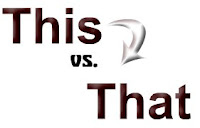Welcome to Thursday's

Running vs Walking
 |
| Pic by Flickr user Valeriebb |
FRIEND: "I'm going jogging for 30 minutes or so to burn some serious calories, do you want to come?"
ME: Nah, I'll go later. I'll do some brisk walking instead of running, but thanks anyways.
You've heard it time and time again - running is better than walking because you burn more calories. With all that sweating and drooling and puffing and panting, you would naturally assume it would, but is it really?
Does it really make a difference and if so how much of a difference. Which one is better for your heart and on your joints? Because let's face it, if you die from a heart attack while jogging (which I've read so many times), then burning calories is the least of your worries. Which one is better for losing weight faster?
In order for me to explain this post, I broke it down into two sections - running vs walking for losing weight, and running vs walking for health reasons.
Running vs Walking - For Losing Weight
Both running and walking can help you burn calories and lose weight, but the difference in calories burned per mile or kilometer is very small, and there is no difference at higher walking speeds.
Although you'll burn about the same amount of calories by walking or running for the same distance, running burns more calories per each minute of exercise, explains the University of Pittsburgh Medical Center.
Walking burns fewer calories than running when you perform it the same amount of time and frequency. A brisk walk can burn more calories. Physical activity may be measured in terms of METs (metabolic equivalent), a unit used to estimate the metabolic cost (oxygen consumption) of physical activity. Just sitting quietly burns 1 MET. If you weigh 150 pounds, that is 68 calories per hour.
A runner and a fast walker, both at a speed of 12 minutes per mile or 5 miles per hour, achieve the exact same 8 MET. Their calories per mile and calories per hour are identical.
Walking at various speeds burns between 2 and 8 MET. Running at various speeds burns between 8 to 18 MET. That sounds like quite a difference, but you have to take into account the length of the workout. Do they run for a set number of miles, or do they run for a set period of time? It makes all of the difference.A runner and a fast walker, both at a speed of 12 minutes per mile or 5 miles per hour, achieve the exact same 8 MET. Their calories per mile and calories per hour are identical.
So what the hell does all this mean? YES, you do burn more calories when running, BUT only in terms of length of time and not distance. This means that you'll burn more calories by running for one minute than walking for one minute. However, if you both covered a distance of 5 miles - both of you would burn the same amount of calories.
And by the way, the amount of calories you will burn depends not only the amount of time you run as mentioned earlier, but also your body weight and the heart rate - knowing your heart rate allows you to increase the intensity to maximize your run/walk or slow down to avoid overdoing it. And as for body weight:
Did You Know the heavier you are, the more calories you will burn at the same speed? For example, running for one hour will burn an estimated 986 calories in a person who's around 160lbs. (roughly 11.42 stones/72.5 kilograms), but 1,229 calories in someone who's around 200 lbs. (14 stones/90.7 kilograms), according to the Mayo Clinic. This is probably why you see some people running or walking with weights strapped to their ankles or wearing weighted vests.
But you only increase your calories burned per mile by about 11-12. It would be far better and easier to just walk an extra 2-5 minutes to burn those same calories. Why risk straining yourself when you don't have to? Which leads me to the next section:
Running vs Walking - For Health Reasons
Running, is without a doubt, one of the more strenuous forms of exercise and can take a heavy toll on your body if not done properly. Problems such as:
Joint problems - When you run you have the potential to place the equivalent load of a baby elephant on your joints. These joints are compressed with every step you take and overuse can cause them to become inflamed, painful and sore. This can lead to serious long term joint disorders unless you look after them. Preventions: stretching for at least 20 mins after running and buying the right pair of shoes with good shock absorbers.
- Running wins hands down. In general, you have to walk nearly an hour, to get a similar weight-loss benefit to a half hour run. Yes, you’ll burn more calories running for 30 minutes than you will walking, however, if a runner and a walker cover the same distance, they burn about the same number of calories... so say the experts.








No comments:
Post a Comment
Hey! Thanks for leaving your comment!